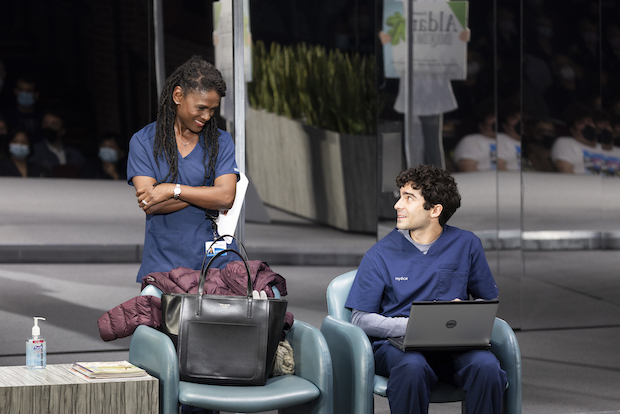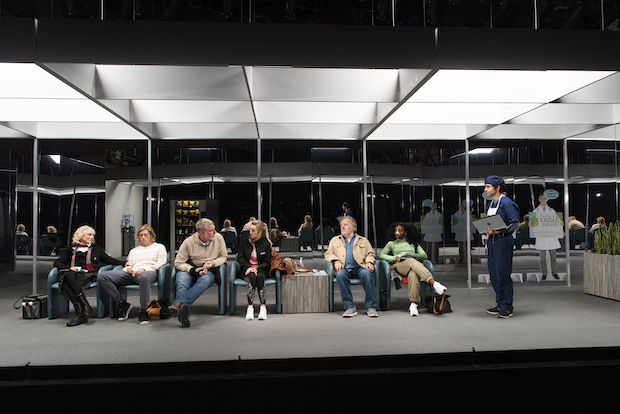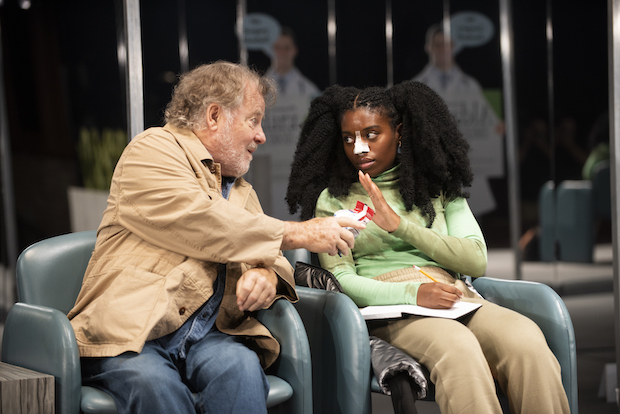Review: Spending a Day in Waiting-Room Purgatory in I'm Revolting
Gracie Gardner makes her off-Broadway debut in this world-premiere play from the Atlantic Theater Company.

(© Ahron R. Foster)
The last line of the biography for playwright Gracie Gardner in the program for her new play I'm Revolting cites an interesting tidbit: that she's also an EMT in Brooklyn. Right from its opening scene, in which dermatologist Denise (Patrice Johnson Chevannes) previews the day's scheduled appointments with resident dermatologist Jonathan (Bartley Booz), a tantalizing air of authenticity permeates the proceedings, with Chevannes and Booz delivering gobs of medical jargon in a convincingly businesslike manner on Marsha Ginsberg's antiseptic-looking gray-and-white waiting-room set. That lived-in feeling, a sense that Gardner truly knows of what she speaks, is enough to lend a measure of coherence to the sprawling play, now making its world premiere with the Atlantic Theater Company.
I'm Revolting is set during one day in the aforementioned waiting room of a skin-cancer clinic. Instead of a neat three-act structure, we observe people going in and out while they wait either to be seen or for their loved ones to reemerge from their operations. Character details gradually swim into view. Reggie (Alicia Pilgrim) is anxious about how she will look after reconstructive surgery on her nose, a worry that her workaholic older sister Anna (Gabby Beans) does little to allay beyond trying to empower her to advocate for herself, regardless of what the doctor says. Liane (Emily Cass McDonnell) has it even worse, with a strangely distant husband, Jordan (Glenn Fitzgerald), and the threat of possibly losing an eye. Clyde (Peter Gerety), by contrast, is something of a veteran at the clinic, here for an annual operation. At one point, he gets into a heated argument with Paula (Laura Esterman), the mother of another patient, Toby (Patrick Vaill), over her New Age-y belief that her son's physical condition is essentially psychological in nature, thus curable with a more positive attitude.

McDonnell, Peter Gerety, Alicia Pilgrim, and Bartley Booz appear in Gracie Gardner's I'm Revolting, directed by Knud Adams, at Atlantic Theater Company.
(© Ahron R. Foster)
The sheer number of characters inhabiting this one space suggests that Gardner is going for an "everything but the kitchen sink" approach, exploring a wide variety of case studies, character profiles, and themes in one work. In I'm Revolting, blind faith in doctors and medicine clashes with a more circumspect, if not outright skeptical, approach, while aged acceptance challenges youthful vanity. Gardner doesn't necessarily valorize one perspective over another; instead, they all coexist in conversation with each other throughout the course of the play's 90 minutes. Gardner's zeal to encompass so much of the human condition in one play means that these characters run the risk of coming off as mere emblems rather than human beings. Plus, one final plot twist at the very end can't help but seem a bit too writerly compared with the naturalism of the rest.
It's a tribute to Gardner's keen attention to character detail that I'm Revolting rarely feels schematic. The generally terrific cast helps, too, as does Knud Adams's fine-tuned direction. Fresh off her Tony-nominated performance in Lincoln Center Theater's Broadway revival of ''The Skin of Our Teeth'', Gabby Beans scores a smaller yet no less impressive scene-stealing triumph in her two scenes, hilariously assertive alongside the initially more reserved Pilgrim. As written, the characters of Liane and Jordan have less on the surface than the rest of the cast, but McDonnell and Fitzgerald do a lot to suggest oceans of unspoken tension in their marriage.

(© Ahron R. Foster)
Gerety and Esterman strike appropriately tense notes in their one big argument scene, but Esterman refuses to turn her character into a bubble-headed caricature; her devotion to her son is never in doubt. Vaill's subtly chilling turn as Jud Fry in the 2019 Broadway revival of Oklahoma! may well be the kind of performance that an actor might find hard to completely shake off in subsequent performances, but as Toby, he does at least exude the sense of a mama's boy who tries to come off as otherwise. Perhaps most impressive of all, though, are Chevannes and Booz: Chevannes a fount of world-weary wisdom and experience compared with the young, idealistic Booz.
If anything, Knud Adams's direction adds an intriguing layer or two to Gardner's play. Beyond Kate McGee's dimming of lights to signal jumps in time (a tactic Adams uses somewhat confusingly), perhaps the most noteworthy touch is the use of mirrors lining the back wall of Ginsberg's set: a slightly surreal element that's perhaps meant to implicate us in the audience as much as its characters. (Clint Ramos took a similar tack in his set for Slave Play, albeit in a completely different context.) The visual gambit is arguably too self-conscious: Gardner's writing in this messy but compelling new play is often enough to organically raise such questions by itself.









